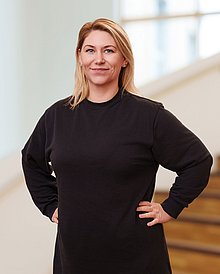Financial burden of cancer: Witten/Herdecke University calls for solutions to support those affected
Prof. Dr. Eva Münster researches the topic of over-indebtedness at Witten/Herdecke University. On World Cancer Day (February 4, 2025), she calls for more targeted support for those affected.

Cancer patients in Germany are not only struggling with the disease itself, but also with the financial burden it brings with it. Around 80% of cancer patients are under considerable financial strain due to co-payments for medication and sickness-related absence from work. This phenomenon, known as "financial toxicity", not only jeopardises quality of life, but can also lead to excessive debt.
Research into the prevention of financial toxicity
Witten/Herdecke University (UW/H) is actively committed to developing solutions to prevent this financial crisis. Prof Dr Eva Münster, holder of the Chair of General Practice and Primary Care in Vulnerable Populations at the Institute of General Practice and Primary Care (iamag) at UW/H, has submitted the interprofessional research proposal "Approaches to the prevention of financial toxicity in cancer patients in Germany" to German Cancer Aid.
"We want to investigate how we can better support those affected in order to avoid the double burden," says Münster. "As a society, we need to focus more on the financial aspects of cancer and develop preventative measures."
Approaches from over-indebtedness research
Results from over-indebtedness research show that this requires both behavioural prevention and structural changes. For example, special courses could be developed to help cancer patients to eat healthily despite financial restrictions or to learn strategies for financial stabilisation in difficult times. Equally important is better information about patients' rights, such as the possibility of being exempted from co-payments or applying for hardship regulations.
"Another crucial approach is to involve social debt counselling at an early stage," explains Münster. While preventative budget counselling already exists in Switzerland, in Germany intervention often only takes place in the event of massive debt. "It would be desirable for counselling options to be available as soon as the first financial uncertainties arise." The system also needs to be adapted: Currently, the hardship scheme is based solely on household income - existing debts are not taken into account.
In addition to structural changes, a change in awareness is also required in society and among medical professionals. "Many people don't know that a serious illness in Germany can lead to financial hardship - it's still a big taboo subject," emphasises Münster. The aim of the research is therefore not only to develop measures, but also to raise awareness of the financial consequences of diseases such as cancer.
Further information:
The interprofessional research proposal "Action approaches for the prevention of financial toxicity in cancer in Germany" was submitted in collaboration with other experts from iamag at UW/H, RheinMain University of Applied Sciences, the Institut für Finanzdienstleistungen e.V. and Kempten University of Applied Sciences.
Photos for download
Contact person

Svenja Malessa
Press Officer
Administration | Communication & Marketing
Alfred-Herrhausen-Straße 48
58455 Witten
Room number: 2.F05
